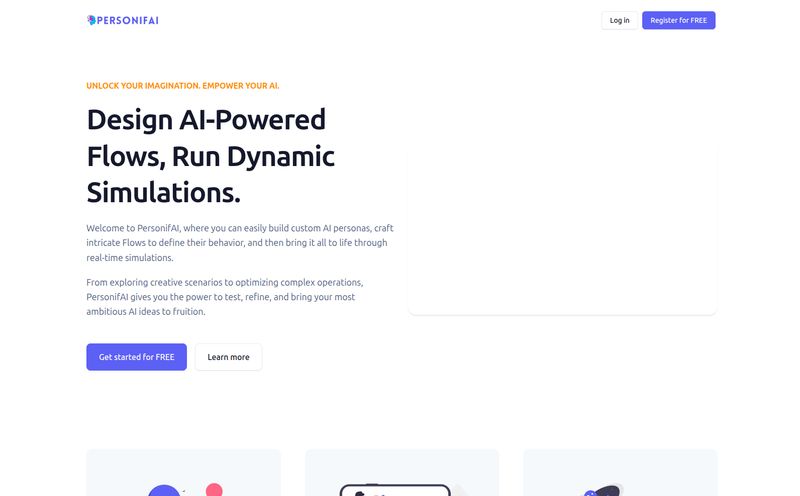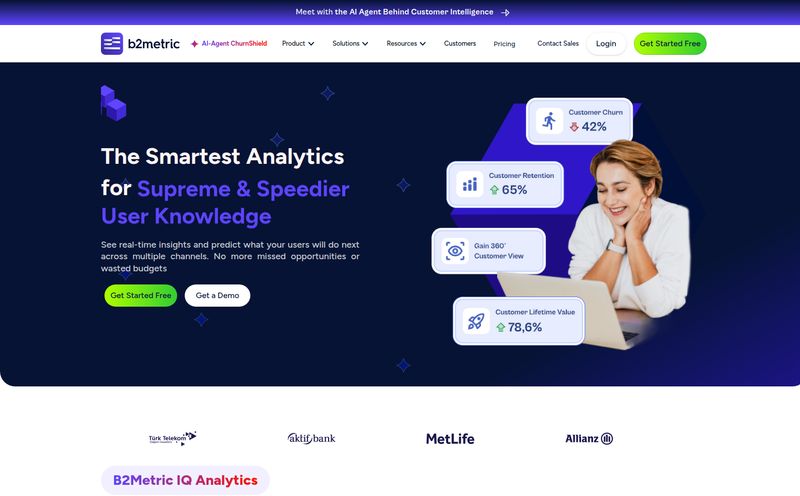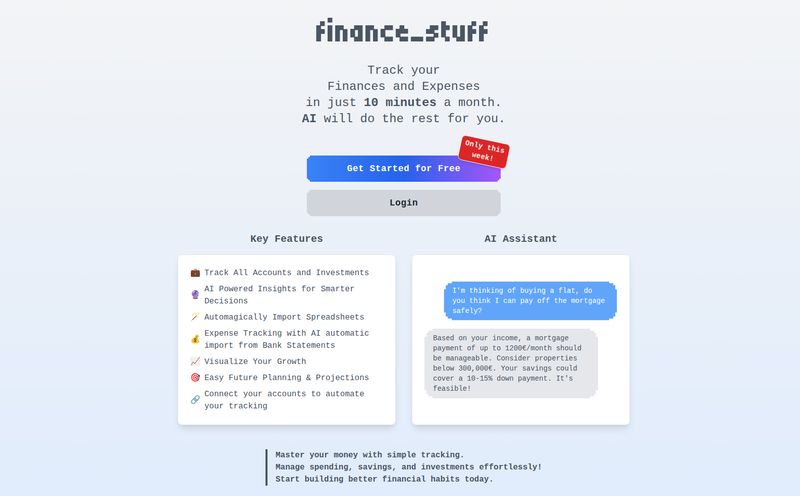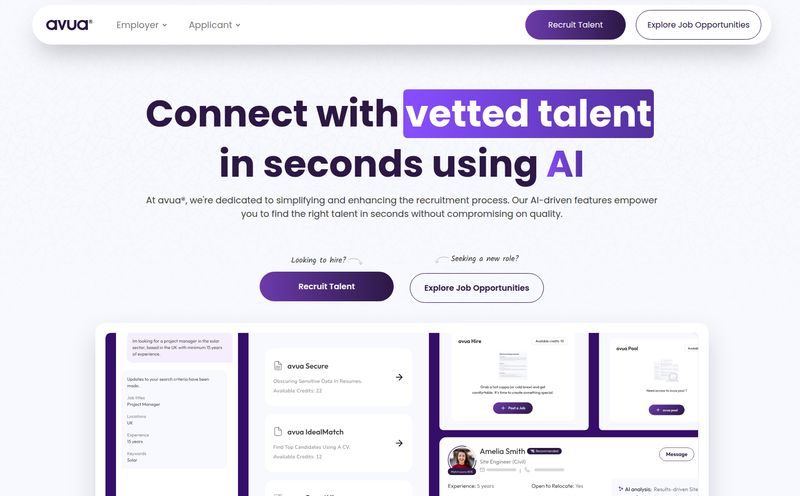In the world of SEO and digital business, we talk a lot about 'data-driven decisions'. It sounds great on a PowerPoint slide, doesn't it? But for most businesses, especially in complex fields like real estate and finance, the reality is less 'data-driven' and more 'data-drowning'.
You know what I’m talking about. The endless tide of PDFs, complex spreadsheets, scanned lease agreements, investment memos, insurance claims… it’s a chaotic mess of what we call unstructured data. It holds all the golden nuggets of information, but trying to extract them manually is a soul-crushing, error-prone task. I've had clients who literally employed teams of people just to read documents and copy-paste information. A total brain drain.
So when a platform like Kolena comes across my desk, claiming to be the answer to this specific nightmare, my curiosity gets the better of me. This isn't just another generic AI chatbot. It’s a specialized platform aimed squarely at enterprises in Property, Finance, and Insurance. And honestly? It’s about time someone tackled this.
What Exactly is Kolena? (And Why Should You Care?)
Forget the high-level marketing speak for a moment. In plain English, Kolena is like a hyper-intelligent digital archivist. You feed it your mountain of messy, unstructured documents—think anything from a 500-page property lease to a detailed financial report or even an audio recording—and it reads, understands, and organizes the crucial information into a neat, clean, spreadsheet-like format. Actionable data. Finally.
But it goes a step further. The real magic seems to be in its “AI Agents.” You can create these custom agents to automate entire workflows. Instead of just extracting data, they can perform tasks based on that data. It’s the difference between hiring someone to read a book and hiring them to read it, write a summary, and then file your taxes based on its contents. It’s a pretty compelling proposition.
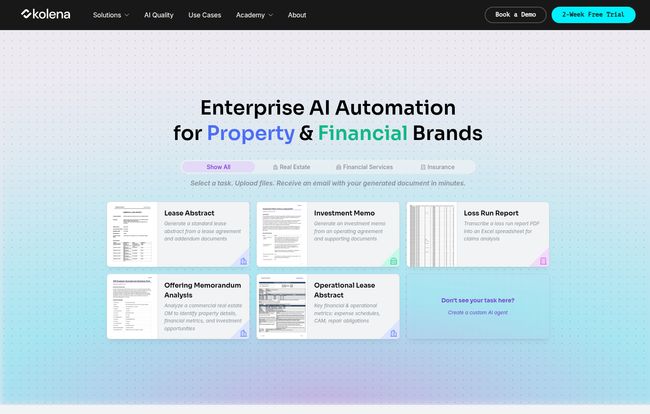
Visit Kolena
The Data Problem Kolena Is Trying to Solve
The core of the problem is that an estimated 80% of business data is unstructured. That statistic from Forbes isn't just a number; it's a massive, expensive headache. Look at the use cases Kolena highlights on its own site:
- Lease Abstract: Imagine having to manually review thousands of commercial leases to find specific clauses about maintenance responsibilities or renewal dates. Oof.
- Investment Memo: Generating a concise summary and pulling key financial metrics from dense, jargon-filled documents.
- Loss Run Report: For insurers, transcribing and analyzing these reports to understand claim history and assess risk is fundamental, and often, a huge bottleneck.
Doing this manually is slow, expensive, and let's face it, boring. Bored employees make mistakes. Mistakes in finance and real estate can cost millions. Automating this isn't just about efficiency; it's about de-risking the entire process.
A Look Under the Hood at Kolena's Features
So how does it actually work? It seems to be built on a few powerful pillars.
Customizable AI Agents for Your Workflows
This is the big one. The idea that you can create a bespoke AI agent for a specific, repetitive task is powerful. It’s about building a digital workforce that doesn’t get tired or need coffee breaks. It can be trained to look for exactly what you need, whether it’s pulling tenant names from a rent roll or identifying risk factors in an insurance application.
Any File, Any Format, Any Time
Kolena claims it can handle pretty much any data type you throw at it—documents, emails, graphs, presentations, and even audio and video. This versatility is a huge selling point. Your data doesn’t live in one neat little box, so your AI solution shouldn’t expect it to. This is a far cry from older systems that would choke on anything more complex than a basic CSV file.
Trustworthy AI with Receipts
In 2024, if your AI is a “black box,” you’re doing it wrong. Especially in regulated industries. One of Kolena's most important features is its promise of trustworthy AI with clear reasoning and citations. This means when it pulls a piece of data, it can show you exactly where it found it in the source document. This isn't just a nice-to-have; for compliance and auditing, it’s a must-have. It builds trust, which has been a major hurdle for AI adoption in the enterprise space.
Who is Kolena Actually For?
While the tech could probably be used anywhere, Kolena is clearly not trying to be everything to everyone. They’ve planted their flag firmly in the soil of Real Estate, Financial Services, and Insurance. And it makes perfect sense. These are industries built on a foundation of dense, complex, and often archaic documents.
You can just picture the scenarios:
- A Real Estate Investment Trust (REIT) using it to perform due diligence on a portfolio of 50 properties, analyzing all leases and financial statements in a fraction of the time it would take a human team.
- An investment bank automating the initial data extraction from pitch books and offering memorandums to speed up M&A analysis.
- An insurance carrier streamlining its claims processing by having an AI agent do teh initial read of loss run reports and flag key details for human underwriters.
The logos on their site—like EAH Housing and The Gateway Companies—back this up. They’re working with real players in the property world, which adds a layer of credibility.
The Good, The Bad, and The "Request a Demo"
Alright, no tool is perfect. Let’s break it down. From my perspective, the advantages are clear: automating tedious work, reducing costly human errors, and freeing up your smartest people to do, well, smart people work instead of glorified data entry.
But there are potential hurdles. The platform’s effectiveness hinges on the quality of your input data. The old saying “garbage in, garbage out” is amplified with AI. If your source documents are a complete mess, you’ll likely need to do some cleanup. Also, setting up these AI agents won’t be a one-click affair. It will require some initial configuration and thought to get them dialed in perfectly for your specific workflow.
The Big Question: What's the Price?
And now, the question on every CFO’s mind. If you go looking for a pricing page on Kolena's site, you won't find one. You’ll find a “Book a Demo” or “2-Week Free Trial” button. This is typical for enterprise-grade SaaS. It’s not a bad thing; it just tells you who their customer is. They aren't selling a $20/month tool for freelancers. They’re selling a powerful solution to large companies with complex problems. The price will almost certainly depend on the scale of your use, the number of documents you process, and the complexity of the workflows you build. My gut says you should expect a significant investment, but one that’s positioned to have an even more significant ROI if you're the right fit.
Frequently Asked Questions about Kolena
- What kinds of data can Kolena handle?
- It's designed to be incredibly flexible, supporting a huge range of unstructured data including PDFs, Word documents, emails, spreadsheets, presentations, and even audio/video files. The goal is to meet your data where it lives.
- Is Kolena secure for sensitive financial data?
- According to their materials, yes. Kolena promotes enterprise-grade security and compliance. Given their target market of finance and insurance, robust security measures are a non-negotiable part of their offering.
- How long does it take to set up a Kolena AI agent?
- This will likely vary. A simple data extraction agent for a standardized report might be quick to configure. A complex, multi-step workflow that mimics a human decision-making process will naturally require more initial setup and testing. This is something to dig into during a demo.
- Is Kolena just for large enterprises?
- While their branding and pricing model point towards larger enterprises, a mid-sized company with a significant document-processing bottleneck could also see a massive benefit. If your team spends hundreds of hours a month on manual data extraction, you might be their ideal customer, regardless of your official company size.
- How does Kolena's AI provide citations?
- This feature, often called 'explainable AI' or XAI, means the platform doesn't just give you an answer; it shows its work. It will pinpoint the exact page, paragraph, or data point in the source document from which it drew the information, which is critical for verification and auditing.
My Final Take on Kolena
So, what’s the verdict? Kolena strikes me as a genuinely useful, highly specialized tool that’s tackling a very real and very expensive problem. It’s not trying to be the next ChatGPT. It's focused on being a workhorse for industries drowning in paperwork.
If you're in real estate, finance, or insurance, and the phrase “manual document review” makes you want to tear your hair out, then Kolena is absolutely worth investigating. It’s a serious tool for a serious business problem. The lack of public pricing and the need for a demo is a filter, ensuring that the people who reach out are the ones who can truly benefit from this level of automation.
It represents a shift from general-purpose AI to applied AI, and that’s a trend I am 100% here for. The first step, as always, is that demo. Go in with your gnarliest document problem and see if they can solve it.
